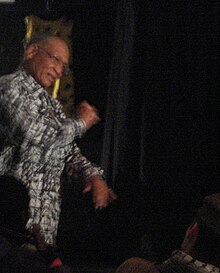Don Mattera

Don Mattera (born November 30, 1935 in Western Native Township , Johannesburg (according to other sources: 1934); actually Donato Francisco Mattera, nickname Bra Zinga ) is a South African writer and journalist . He has won numerous awards and is known for his fight against apartheid .
Life
Mattera's grandfather was an Italian who married a Xhosa from the east of what was then the Cape Province . Don Mattera's father was classified as an Italian. His mother was from the Batswana people . Don Mattera was born in Johannesburg's Western Native Township , today part of Westbury . Under the apartheid system, it was classified as Colored .
Mattera was adopted by his paternal grandparents and attended a Catholic boarding school in Durban . At the age of 14 he returned to Johannesburg and from then on lived in Pageview . He later moved to the neighboring district of Sophiatown , at that time a cultural center mainly for blacks in South Africa. There he was the leader of the gangster gang The Vultures (German: Die Geier).
He was politically active against the regime and was banned from 1973 to 1982 . He was under house arrest for three years . He was tortured several times. Mattera was a member of the Black Consciousness Movement and joined the African National Congress Youth League . He helped found the Union of Black Journalists and the Congress of South African Writers . He also became a member of the 1983 National Forum , a founding of the Azanian People's Organization , which was more radical than the opposition United Democratic Front . In 1987 his autobiography Memory is the Weapon was published, which is mainly about his time in Sophiatown .
Mattera worked as a journalist for the South African newspapers The Star , The Sunday Times , The Sowetan and The Weekly Mail . He trained numerous South African journalists and was a co-founder of the Skotaville publishing house . Mattera converted to Islam and is known for his extensive social commitment in his place of residence, the Johannesburg district of Eldorado Park . He initiated the Harvey Cohen Center for mentally and physically disabled children and supports the reintegration of former prisoners. The texts in the musical African Footprint , which premiered in 2000, are poems by Mattera. In 2003 he was a jury member at the International Documentary Film Festival Amsterdam .
Mattera has nine children.
Awards
- 1983: PEN Award for Azanian Love Song
- 1987: Tucholsky Prize , Sweden
- 1987: Steve Biko Prize for Memory is the Weapon
- 1993: Noma Children's Book Award for The Five Magic Pebbles
- Honorary Doctorate in Literature from the University of Natal
- 1997: World Health's Organization’s Peace Award from the Center of Violence and Injury Prevention
- 2006: South African Order of the Baobab in Gold
- 2009: Honorary doctorate in literature from Witwatersrand University
Works
Plays
- Street kids
- Apartheid in the Court of History
- 1983: Kagiso Sechaba
- 1983: One Time Brother (banned in 1984)
prose
- Memory is the Weapon , Ravan Press, Johannesburg 1987, ISBN 0-86975-325-8
- Gone with the Twilight: A Story of Sophiatown. Zed Books, London 1987, in the USA as Sophiatown: Coming of Age in South Africa
- The storyteller. Justified Press, 1994, ISBN 0-947451-16-1
- The Five Magic Pebbles. Skotaville, Johannesburg 1992, ISBN 0-947479-71-6
- Sophiatown. Peter Hammer, Wuppertal 1994, ISBN 3-87294-628-5 (compilation from Memory is the Weapon and Gone with the Twilight )
Volumes of poetry
- Azanian Love Song. Skotaville, Johannesburg 1983, ISBN 0-620-06628-8
- Exiles Within. The Writers' Forum, 1984
- The Heart of Love. AVS, 1997
Web links
- Detailed interview with Mattera about his life (English, partly Swedish)
- Findings matteras on the website of the South African president (English)
- Biography at joburg.org.za (English)
- Four poems matteras (English)
Individual evidence
- ↑ Report at sahistory.org.za (English), accessed on October 24, 2014
- ↑ a b c d Detailed interview with Mattera about his life (English, partly Swedish), accessed on January 17, 2011
- ↑ Data of the Festival 2003 ( Memento from October 1, 2006 in the Internet Archive ) (English), accessed on January 16, 2011
- ↑ Portrait of Matteras on the Johannesburg website ( Memento from August 29, 2013 in the Internet Archive ) (English)
- ^ Acknowledgment of Mattera on the website of the South African President , accessed on April 7, 2018
- ↑ Acknowledgment of Mattera by the Witwatersrand University (English), accessed on April 7, 2018
- ↑ Information on Mattera's works , accessed on January 17, 2011
| personal data | |
|---|---|
| SURNAME | Mattera, Don |
| ALTERNATIVE NAMES | Mattera, Donato Francisco (full name); Bra Zinga (nickname) |
| BRIEF DESCRIPTION | South African writer and journalist |
| DATE OF BIRTH | November 30, 1934 or November 30, 1935 |
| PLACE OF BIRTH | Western Native Township , Johannesburg |